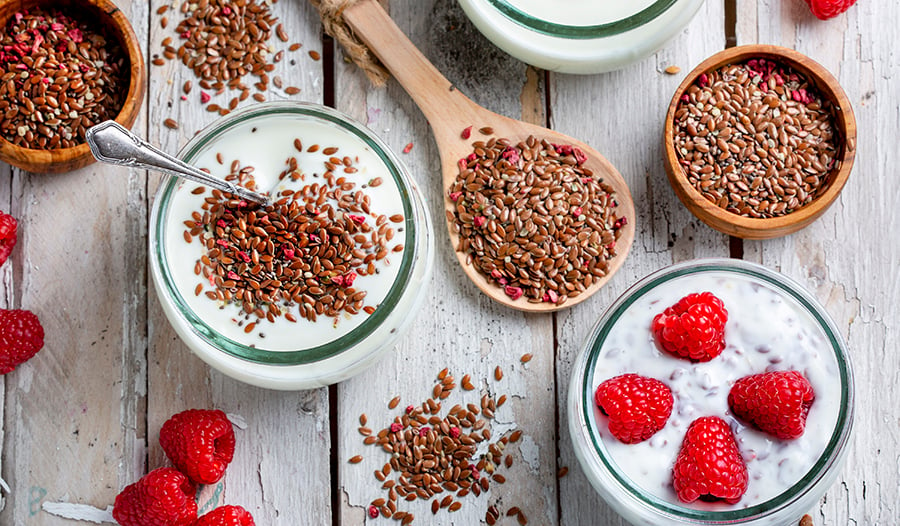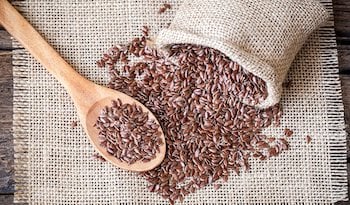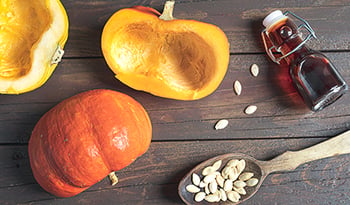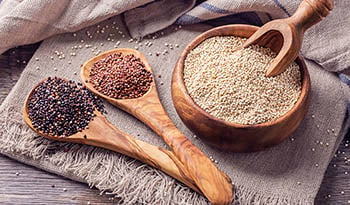4 Health Benefits of Flaxseeds
DISCLAIMER:This blog does not intend to provide diagnosis...
- In this article:
- What Are Flaxseeds?
- Flaxseed Health Benefits
- How to Use Flaxseeds and Flaxseed Oil
- Simple Flaxseed Oil Salad Dressing Recipe

What Are Flaxseeds?
Flax (Linum usitatissimum) is a plant native to the Mediterranean that has been consumed and used to make linen for over 5,000 years.
Flaxseeds are small amber to reddish brown seeds with a hard, smooth, shiny shell. Flaxseeds have a nutty, sweet, and earthy taste.
They are usually not consumed whole and are more commonly ground to become easier to absorb nutrients and provide maximum health benefits. Cold-pressed flaxseed oil is an excellent way to obtain the health benefits of flaxseed more easily.
Flaxseed Health Benefits
1. Nutritionally Rich
Flaxseeds are rich in essential fatty acids, minerals, vitamins, fiber, and protein.
The major fatty acid in flaxseed and flaxseed oil is the essential omega-3 fatty acid, alpha-linolenic acid (ALA). Of the total fat in flaxseeds, 58% is in the form of ALA. Only two fatty acids are considered essential for humans because they can serve as the base for other required fats. ALA is the essential omega-3 fatty acid. Linoleic acid (LA) is the essential omega-6 fatty acid.
While ALA is an omega-3 fatty acid, it is shorter than the longer omega-3s found in fish oils (EPA and DHA). ALA can be converted to EPA and DHA in the body, but more is needed to meet these longer omega-3s. However, ALA has shown its health benefits in promoting heart health beyond serving as a building block to EPA and DHA. Flaxseed oil and ground flaxseeds provide oleic acid, a monounsaturated fat found in most nuts, seeds, olive oil, and avocados. Oleic acid, perhaps the most important monounsaturated fat, is also associated with heart health.
2. Gut Health
Not surprisingly, a considerable amount of scientific research has shown that flaxseed consumption, including ground flaxseeds, can produce significant health benefits, including helping to promote regular bowel movements, lowering cholesterol, and proper estrogen metabolism.
3. Heart Health
Ground flaxseeds improve cardiovascular health through beneficial fatty acids and dietary fiber compounds. In one double-blind trial, 36 postmenopausal women were given 40 grams (approximately three tablespoons) of either ground flaxseeds or a wheat-based placebo daily for three months. In the women given ground flaxseeds, blood levels of total cholesterol and cholesterol-carrying molecules dropped by at least 6%. Based on a double-blind study conducted at a research center in Canada, ground flaxseeds can also improve vascular function and blood pressure control.
4. Hormone Health
One of the key compounds in the fiber portion of ground flaxseeds is lignan precursors. Lignans exert many beneficial effects, primarily on breast health in women and prostate health in men. Lignans increase the production of sex hormone-binding globulin, or SHBG. This protein binds sex hormones such as estrogen and can help escort excess estrogen from the body. Much scientific evidence demonstrates that lignans have significant health benefits in both men and women related to their ability to support normal hormone metabolism.
How to Use Flaxseeds and Flaxseed Oil
Flaxseeds can be purchased either whole or ground. Most of the beneficial research has focused on the use of ground flaxseeds.
It is highly recommended to purchase ground organic flaxseeds in a vacuum-sealed package or flaxseed that has been refrigerated since once flaxseeds are ground, they are much more prone to oxidation and spoilage.
Here are some quick and easy serving ideas:
- Add 1-2 tablespoons of ground flaxseeds to your hot or cold cereal.
- Add ground flaxseeds to your breakfast smoothie.
- To give cooked vegetables a nuttier flavor, sprinkle some ground flaxseeds on top of them.
- Mix ground flaxseeds into yogurt.
Do not cook with flaxseed oil; it is far too fragile and easily damaged by heat and light. Taking flaxseed oil by swigging it down or by the tablespoon could be more palatable. So, instead, use it as a salad dressing, dip your bread into it, add it to your hot or cold cereal, or spray it over your popcorn.
Simple Flaxseed Oil Salad Dressing Recipe
Ingredients:
- 4 tablespoons organic flaxseed oil
- 1 1/2 tablespoon lemon juice
- 1 medium garlic clove, crushed
- Pinch of sea salt or salt-free seasoning
- Fresh ground pepper to taste
Instructions:
Place all ingredients into a mixing bowl and whisk together until smooth and creamy. Feel free to jazz up this basic recipe to your taste by using your favorite herbs and spices.
References:
- Noreen S, Tufail T, Ul Ain HB, Awuchi CG. Pharmacological, nutraceutical, and nutritional properties of flaxseed (Linum usitatissimum): An insight into its functionality and disease mitigation. Food Sci Nutr. 2023 Oct 3;11(11):6820-6829.
- Parikh M, Maddaford TG, Austria JA, Aliani M, Netticadan T, Pierce GN. Dietary Flaxseed as a Strategy for Improving Human Health. Nutrients. 2019 May 25;11(5):1171.
- Edel AL, Rodriguez-Leyva D, Maddaford TG, et al. Dietary flaxseed independently lowers circulating cholesterol and lowers it beyond the effects of cholesterol-lowering medications alone in patients with peripheral artery disease. J Nutr. 2015 Apr;145(4):749-57.
- Maddaford TG, Ramjiawan B, Aliani M, Guzman R, Pierce GN. Potent antihypertensive action of dietary flaxseed in hypertensive patients. Hypertension. 2013 Dec;62(6):1081-9.
- Chhillar H, Chopra P, Ashfaq MA. Lignans from linseed (Linum usitatissimum L.) and its allied species: Retrospect, introspect and prospect. Crit Rev Food Sci Nutr. 2021;61(16):2719-2741.
- Adolphe JL, Whiting SJ, Juurlink BH, Thorpe LU, Alcorn J. Health effects with consumption of the flax lignan secoisolariciresinol diglucoside. Br J Nutr. 2010 Apr;103(7):929-38.
- Burdge GC. Α-linolenic acid interconversion is sufficient as a source of longer chain ω-3 polyunsaturated fatty acids in humans: An opinion. Lipids. 2022 Nov;57(6):267-287.
- Yuan Q, Xie F, Huang W, Hu M, Yan Q, Chen Z, Zheng Y, Liu L. The review of alpha-linolenic acid: Sources, metabolism, and pharmacology. Phytother Res. 2022 Jan;36(1):164-188.
- Bertoni C, Abodi M, D'Oria V, Milani GP, Agostoni C, Mazzocchi A. Alpha-Linolenic Acid and Cardiovascular Events: A Narrative Review. Int J Mol Sci. 2023 Sep 20;24(18):14319.

 By Dr. Michael Murray, N.D.
By Dr. Michael Murray, N.D. 


